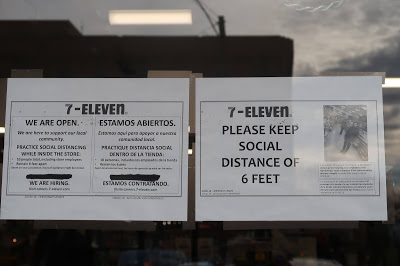Police prefer voluntary compliance with social distancing rules
 |
| Violating the social distancing rules is a Class 1 misdemeanor. |
UPDATED April 2: While the Fairfax County Police Department has the authority to charge people who violate the stay-at-home order, they prefer to get people to voluntarily comply.
Violations of key provisions in executive orders issued by Virginia Gov. Ralph Northam aimed at curbing the spread of coronavirus are a Class 1 misdemeanor. That applies to the prohibition of gatherings of more than 10 people, in-person dining in restaurants, in-person college classes, requirements for social distancing in businesses, and the closure of recreational and entertainment venues, public beaches, and personal care businesses.
A Class 1 misdemeanor is punishable by up to 12 months in jail and a fine of up to $2,500.
The FCPD’s goals in dealing with violators is “to educate, inform, seek voluntary compliance, and enforce only if necessary,” says spokesperson 2nd Lt. John Lieb.
Master Police Officer Eddy Azcarate of the Mason Police District says, “to my knowledge, there haven’t been any arrests in Mason” for violations of the governor’s order. There have been “very few calls” about groups with 10 or more people. “They are asked to voluntarily disperse and most people are actually complying very well.”
In one example, police followed up on a call about a soccer game at Mason District Park, Azcarate says. Police reminded the players about the governor’s order and they broke up the game and left. Police also broke up a teen party on a Lake Barcroft beach, but that was when social distancing was recommended, not ordered.
Azcarate doesn’t know of any businesses that have violated the order in the Mason Police District. “Business required to close have closed,” he says, although “we’re not going around checking every barbershop or Hair Cuttery or massage parlor to see if they are closed.”
Officers are spending more time at shopping centers, he noted, “so we can provide extra vigilance for businesses that have had to close.” The police are also patrolling places where people are congregating, such as grocery stores, to make sure there are no issues. There have been a couple of minor incidences, such as disorderly conduct, he says, but nothing out of the ordinary.
If the police receive a complaint – about a restaurant with more than 10 people inside, for example – they would “visually try to observe the violation and get voluntary compliance and give them a warning,” FCPD Chief Edwin Roessler told ABC News.
Related story: Gov. Northam issues stay-at-home order
The police would contact the Health Department to issue a warning and follow up with the code compliance team, Roessler said. If the business still doesn’t comply, a circuit judge could issue an immediate injunction. “Then they would be electronically and verbally served with an order to shut down the business.”
There have been a few cases around the country where police arrested people for violating social distancing rules, ABC News reported, including a man in Charles County, Md., who threw a large party, a bar operator in New York City, and a pastor in Tampa, Fla.
Roessler has also taken steps within the department to protect the safety of FCPD employees and the community during the coronavirus crisis. The department conducts meetings and roll calls through video conferencing technology and stepped up cleaning of police cruisers.
In addition, Azcarate says, school resources officers, crime prevention officers, and some of the station-level detectives have been assigned to assist the patrol units.
The community police reporting system, which responds to people calling the non-emergency phone number, has been expanded, Azcarate says. Instead of sending officers in person to investigate complaints, most calls to are handled over the phone. “If there’s a danger to the public, a crime, or an accident blocking traffic, “we will go out and do what we normally do.”
In cases where the police have to interact with the public, they are taking steps to distance themselves, if possible. “We are very fortunate that the department is well-stocked with personal protective equipment. We all have glasses, gloves, and n95 masks,” he says. “There’s a couple of places we go, like hospitals, where we wear them when going in. Otherwise it’s at our discretion.”
When people make a service call, they are asked some screening questions about their body temperature and whether they have a persistent cough, have difficulty breathing, or are out of breath, Azcarate says. If that is the case, the officer is warned before they arrive so they know the potential health risk. And when an officer shows up, they maintain a six-foot distance.
Officers also try to maintain a distance during traffic stops but that is difficult as they still have to approach the driver to get a signature, he says. People who come to the Mason Police Station to file a police report do so over the phone in the lobby rather than meeting with an officer in person.
In one silver lining, Azcarate says, service calls and crime seems to have declined in recent weeks, at least in the Mason Police District.

